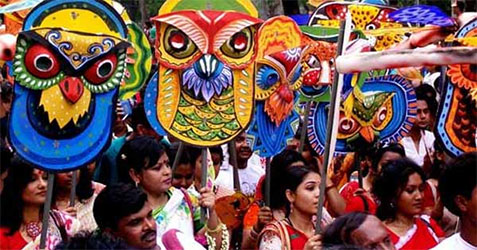


Bengali New Year / Poila Baishakh 2025
Naba Barsha in Bengal marks the first day of Baisakh - the first month of Bengali Calendar. The festival usually falls on the 14th or 15th day of April according to English Calendar Year. Naba Barsha festival is known as Poila Baisakh.
Bengali New Year is referred to in Bengali as 'Pohela Boishakh' or 'Nabo Barsho'. In Bengali, Pohela stands for 'first' and Boishakh is first month of Bengali calendar. Nabo means new and Barsho means year. It is basically a harvest festival that celebrates the beginning of crop cycle in Bengal Baisakh also ushers in the beginning of the new agricultural season in Bengal.
The Bengali calendar is derived from the Hindu solar calendar, which is itself based on the Surya Siddhanta. King Shoshangko of ancient Bengal, who ruled approximately between 590 CE and 625 CE, is credited with starting the Bengali era. His kingdom encompassed West Bengal, Bangladesh and parts of Bihar, Odisha and Assam. The starting point of the Bengali era is estimated to be on Monday, 12 April 594 in the Julian Calendar and Monday, 14 April 594 in the proleptic Gregorian calendar.
Bengali New celebrated in both Bangladesh and the Indian state of West Bengal, and in Bengali communities in the other Indian states, including Assam, Tripura, Jharkhand and Odisha. It coincides with the New Year's Days of numerous Southern Asian calendars.
This day is also known as Bangla New Year. If we try to trace back to the origin of this tradition, it goes to the Mughal Era. Emperor Akbar first ordered for a new calendar according to the harvesting calendar of the state of Bengal. It was getting harder to collect taxes according to the Hijri calendar. To make the process easier, the Bangla calendar was made according to the solar and lunar year. The first month of the calendar is Boishakh and we celebrate the first day of Boishakh as Pohela Boishakh.
As the year draws to a close, Bengalis throng to the bookstall to book a copy of Panjika, the Bengali almanac. It's a rather fat yearlong handbook to help you find festival timings, favorable days, auspicious dates for anything from wedding to housewarming, from starting a journey to launching a business and more.

Houses are not only cleaned thoroughly, but also beautifully decorated. Women make awesome rangolis at the entrance of house. People wear new clothes and go about socializing - exchange sweets and pleasantries among friends and acquaintances. Younger people touch the feet of elders and seek their blessings for the coming year. People also visit friends and dear ones to wish each other 'Shubho Nabo Barsho!'
Poila Baisakh is celebrated with magnificent grandeur. Pohela Boishakh is the day for cultural programmes. Prayers are offered for the well-being and prosperity of the family. Young ladies clad in white saris with red borders and men clad in dhuti and kurta take part in the Probhat Pheriprocessions early in the morning to welcome the first day of the year. Long queues of devotees are seen in front of the Kalighat temple from late night. Devotees offer puja to receive the blessings of the almighty. There's also a custom of wearing gem-studded rings to appease the stars and planets.
This day being auspicious, new businesses and new ventures are started. The Mahurat is performed, marking the beginning of new ventures. One of the most interesting traditions of Pohela Boishakh is Halkhata. The Bengali Hindu traders purchase new accounting book. The accounting in the halkhata begins only after offering puja. Mantras are chanted and 'shostik' ('Hindu swastika') are drawn on the accounting book by the priests.
Ganesh and Lakshmi Puja are solemnized in almost all shops and business centers, and regular customers are formally invited to attend the evening party. Haal Khata also means settling of all outstanding dues of the preceding year.
People prepared Bengali delicacies, especially sweet dishes, because it's thought to be a good omen to start the year with mishtanna or traditional sweets such as Rosogollas, Payesh, Sandesh, Kalakand and Ras Malai. The New Year cuisine for lunch, of course, contains various preparations of fish and rice.